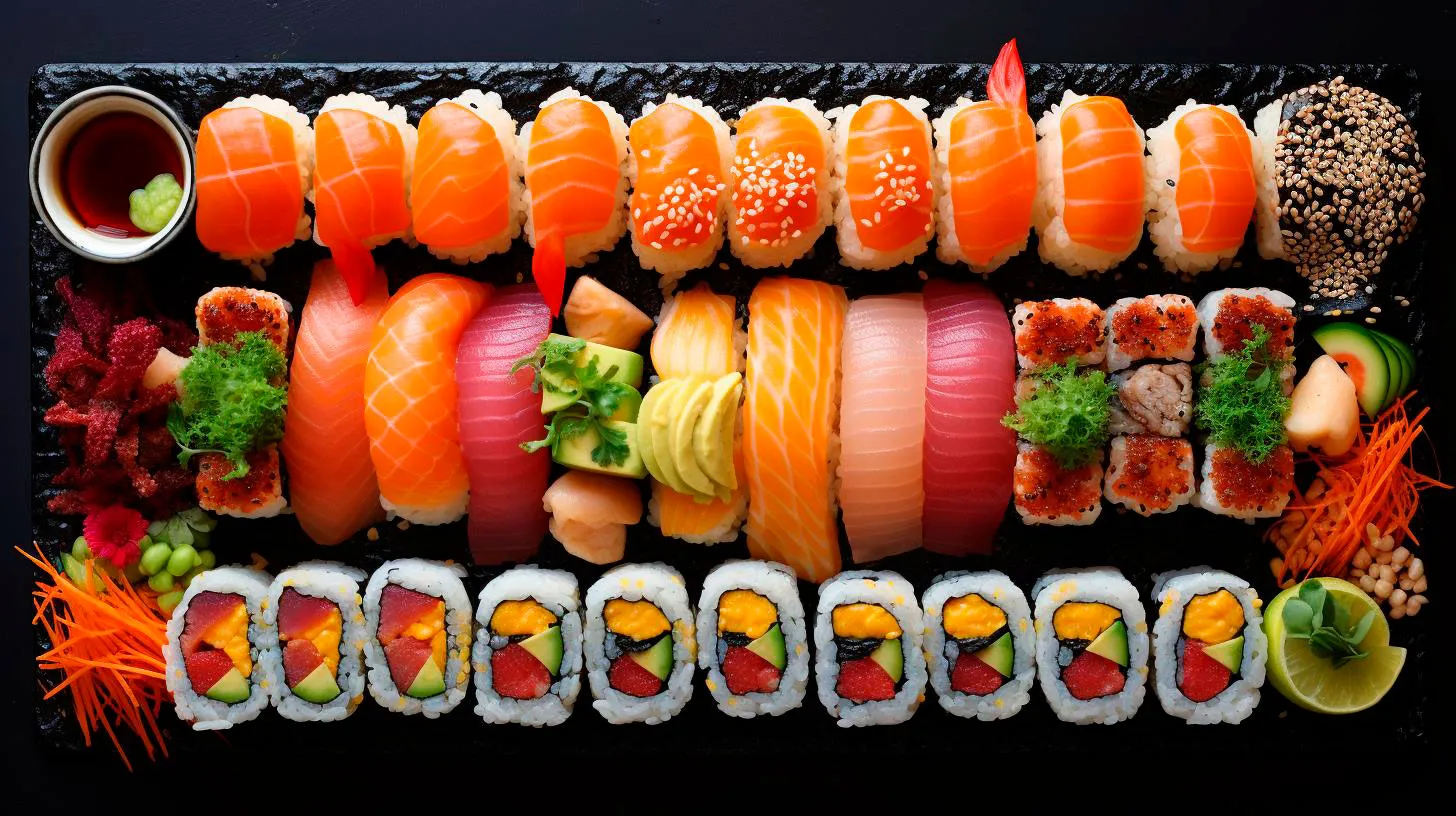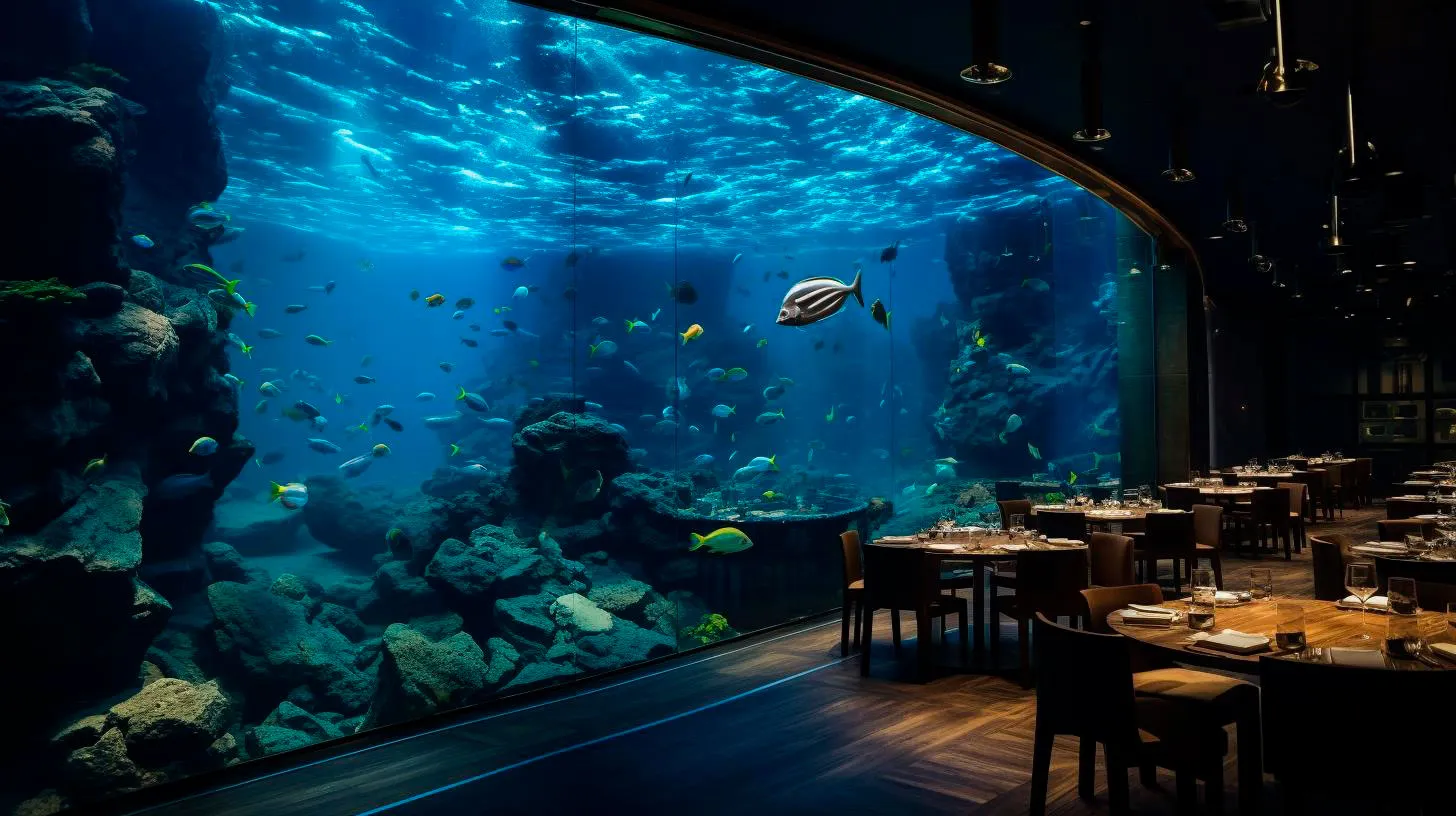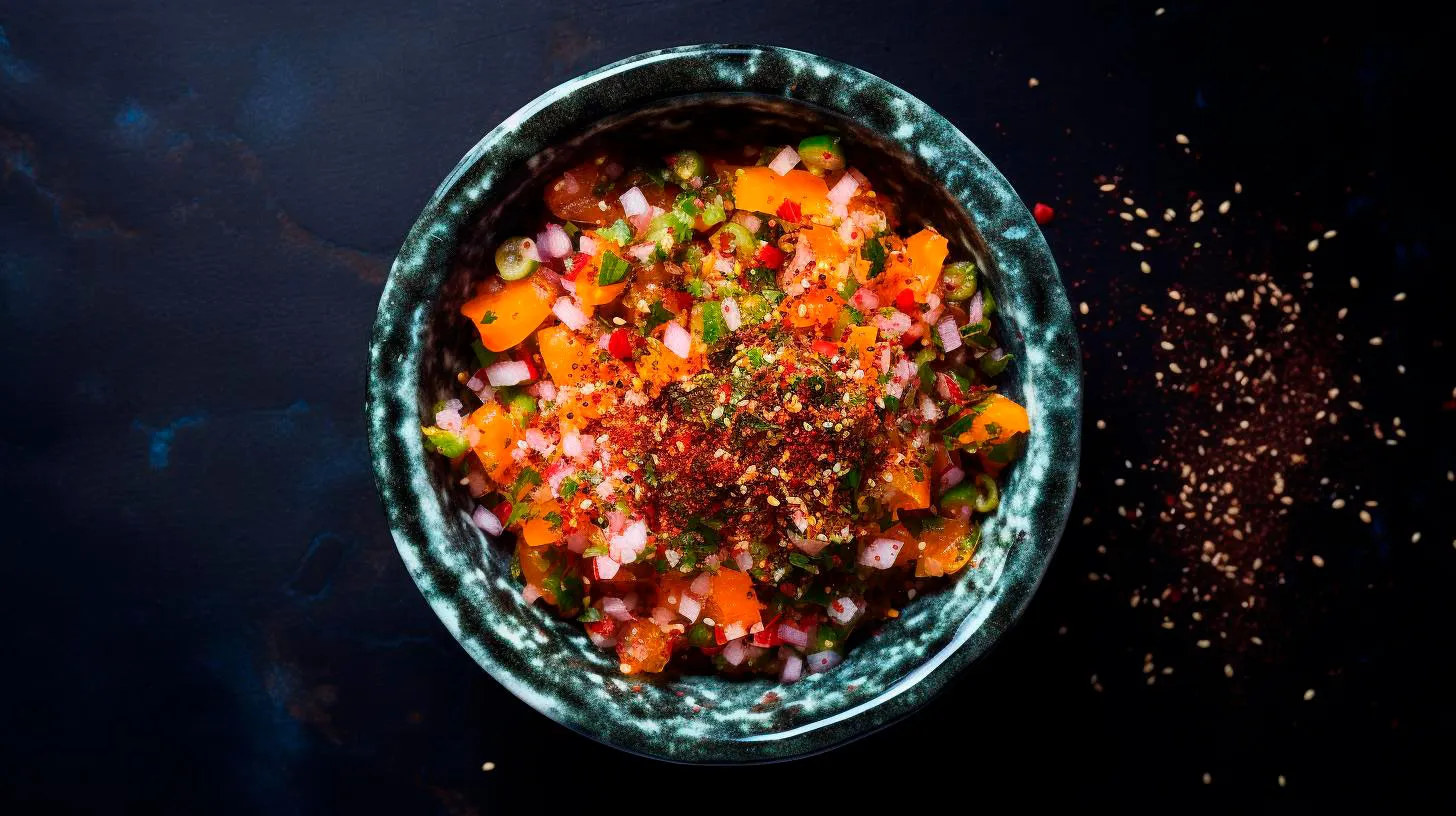Redefining Tradition: Sustainable Sushi Chefs Embrace Eco-Friendly Ingredients
This new trend not only prioritizes the preservation of marine ecosystems but also offers an opportunity to experience sushi in a guilt-free manner. In this article, we will explore how sustainable sushi chefs are making a positive impact on the environment while still delivering exceptional taste and quality.
The importance of sustainable sushi
Sushi, traditionally made with raw fish, requires the utilization of marine resources. Unfortunately, overfishing has become a significant problem, leading to the depletion of various fish populations and damaging the delicate balance of marine ecosystems. By embracing sustainable ingredients, sushi chefs can help combat this issue and contribute to the preservation of our oceans.
Key Takeaway: Sustainable sushi promotes the protection of marine ecosystems and fish populations.
What makes sushi sustainable?
Sustainable sushi focuses on utilizing ingredients that are responsibly sourced and harvested. This means sourcing fish that are abundant and caught using sustainable fishing practices. Chefs also consider the impact of their ingredient choices on the environment, including the use of organic and locally sourced produce.
- Sustainable fishing practices: Sushi chefs choose ingredients that come from fisheries practicing responsible and sustainable fishing methods, such as line-caught or pole-caught fish.
- Responsibly sourced ingredients: By selecting fish that are abundant and not overexploited, chefs ensure that they are not contributing to the depletion of fish populations.
- Organic and local produce: Chefs prioritize using organic and locally sourced vegetables, minimizing the carbon footprint associated with transportation and reducing pesticide use.
Key Takeaway: Sustainable sushi involves responsible sourcing of ingredients, including selecting abundant fish and utilizing organic and locally sourced produce.
Sustainable sushi’s impact on taste and quality
Embracing eco-friendly ingredients does not mean compromising taste or quality. In fact, sustainable sushi chefs believe that using fresh, responsibly sourced ingredients enhances the overall dining experience. By supporting sustainable fisheries, chefs can access high-quality fish at their peak freshness, resulting in sushi that is bursting with flavor.
- Freshness: Sustainable fishing practices ensure that fish are caught and delivered promptly, allowing chefs to create sushi using the freshest ingredients available.
- Flavor and texture: By using responsibly sourced ingredients, chefs can provide sushi that has a superior taste and texture, elevating the dining experience for sushi enthusiasts.
Key Takeaway: Sustainable sushi, made with fresh and responsibly sourced ingredients, offers an enhanced flavor and texture.
The rise of sustainable sushi restaurants
As the demand for sustainability grows, an increasing number of sushi restaurants are incorporating eco-friendly practices into their operations. These establishments prioritize sourcing sustainable ingredients, minimizing waste, and reducing their environmental impact. By supporting these restaurants, sushi enthusiasts can enjoy their favorite cuisine while contributing to a more sustainable future.
- Sustainable ingredient selection: Sustainable sushi restaurants carefully curate their menu to include responsibly sourced fish and organic, locally grown produce.
- Waste reduction: These restaurants promote practices such as recycling, composting, and reducing food waste to minimize their environmental footprint.
- Education and awareness: Sustainable sushi restaurants often educate their customers about the importance of sustainable dining practices, encouraging them to make informed choices.
Key Takeaway: Sustainable sushi restaurants prioritize sustainable ingredient selection, waste reduction, and customer education.
The future of sustainable sushi
Sustainable sushi is not just a passing trend; it represents a fundamental shift in the culinary industry. As the importance of sustainability continues to be recognized, sushi chefs and restaurants will play a crucial role in reshaping the industry’s practices. By embracing eco-friendly ingredients and practices, sushi can adapt to a changing world while still offering a delightful gastronomic experience.
- Industry collaborations: Sushi chefs can collaborate with sustainable seafood organizations and environmental agencies to promote responsible fishing and ingredient sourcing.
- Technological advancements: Innovations such as lab-grown fish and plant-based alternatives provide sustainable options for sushi chefs and customers alike.
- Consumer demand: Sushi enthusiasts can drive the demand for sustainable sushi, encouraging more chefs and restaurants to prioritize eco-friendly practices.
Key Takeaway: The future of sushi lies in the hands of chefs, restaurants, and consumers who embrace sustainable ingredients and advocate for environmentally friendly practices.
Sustainable sushi chefs are reshaping traditional culinary practices, placing the preservation of our oceans at the forefront. By sourcing responsibly, utilizing organic produce, and reducing waste, they are not only creating exceptional sushi but also paving the way for a more sustainable future. The next time you indulge in this delicacy, look for restaurants that prioritize sustainability, and savor the guilt-free pleasure of eco-friendly sushi.
Conservation on the Menu: The Culinary Maestros Crafting Sustainable Sushi Delights
The Sushi Industry and its Impact
Before we dive deeper, let’s take a moment to understand the scope of the sushi industry. According to recent statistics, sushi consumption has been on the rise, with an annual growth rate of approximately 8%. In fact, in 2019 alone, the global sushi market was valued at a staggering $14.84 billion.
However, this tremendous demand poses significant challenges for marine ecosystems. Unsustainable fishing practices and overfishing have threatened numerous fish species, including some commonly used in sushi recipes. If left unchecked, these practices could have devastating consequences for both marine life and the industry itself.
The Rise of Sustainable Sushi
Thankfully, a new wave of sushi chefs and restaurant owners has taken it upon themselves to champion sustainable fishing and promote responsible sourcing. These culinary maestros understand the importance of protecting our oceans while continuing to create culinary masterpieces.
Key Takeaways:
- Sustainable sushi aims to minimize the negative impact on marine ecosystems.
- It promotes responsible fishing and sourcing practices.
- Chefs are playing a crucial role in raising awareness and implementing sustainable practices.
The Role of Chefs in Sustainable Sushi
Chefs hold the power to influence not only diners’ palates but also their perspectives. By prioritizing sustainable practices, they encourage consumers to make conscious choices for the environment. This can have a ripple effect, creating a sustainable seafood movement.
Sustainable sushi chefs collaborate with trusted suppliers who follow guidelines set by sustainability organizations such as the Marine Stewardship Council (MSC). They prioritize using locally sourced ingredients and seasonality, reducing the carbon footprint associated with long-distance transportation.
Additionally, they explore an array of alternative ingredients that are high in flavor, sustainable, and less vulnerable to overfishing. These include seaweed, sustainably farmed shellfish like mussels and oysters, and lesser-known fish species that are abundant in local waters.
Advantages of Sustainable Sushi:
- Preserves marine biodiversity and protects endangered species.
- Supports local fishers and promotes sustainable livelihoods.
- Encourages responsible fishing practices for the overall health of oceans.
The Impact on the Sushi Industry
The conscious efforts of these culinary maestros are not only helping to preserve our oceans but also ensuring the long-term viability of the sushi industry. As consumers become more aware of the environmental impact of their food choices, they are actively seeking out establishments that prioritize sustainability.
Restaurants that feature sustainable sushi on their menus are seeing a surge in popularity, attracting eco-conscious customers who appreciate both the flavors and the principles behind their culinary creations. Therefore, embracing sustainability is not only an ethical choice but also a strategic decision for long-term success in the competitive culinary landscape.
Key Takeaways:
- Consumer demand for sustainable dining options is increasing.
- Restaurants embracing sustainability experience higher customer satisfaction and loyalty.
- Sustainable practices contribute to long-term success in the culinary industry.
The Future of Sustainable Sushi
The future of sustainable sushi looks promising. As more chefs and restaurant owners recognize the importance of sustainable practices, innovative solutions are emerging. For instance, some sushi establishments have started to include educational materials on their menus, providing diners with information about the sustainability of their seafood choices.
Furthermore, sustainable sushi chefs are using their platform to educate their peers and the public about the crucial role of preserving marine ecosystems. They encourage discussions, participate in sustainability forums, and collaborate with conservation organizations to find new ways to promote sustainability within the industry.
Key Takeaways:
- The sustainability movement in the sushi industry is gaining momentum.
- Education and collaboration are key to fostering sustainable practices.
- Chefs continue to drive innovation and inspire positive change within the industry.
Next time you savor a delectable piece of sustainable sushi, remember that behind the artistic presentation lies a profound commitment to protecting our oceans. By choosing sustainable sushi delights, you become part of this global effort, ensuring a healthy and flavorful future for generations to come.
From Farm to Table: How Sustainable Sushi Chefs Prioritize Local and Organic Produce
Traditionally, sushi has relied heavily on imported seafood, which poses significant environmental challenges. However, a new wave of sushi chefs is challenging this norm by incorporating local and organic ingredients into their dishes, creating a more sustainable and environmentally friendly dining experience.
In this article, we will explore how sustainable sushi chefs are prioritizing local and organic produce, the benefits of this approach, and the key takeaways for both chefs and consumers.
The Rise of Sustainable Sushi
Sustainable sushi is gaining momentum around the world. Chefs are recognizing the importance of their role in promoting environmental stewardship and are proactively seeking out local and seasonal ingredients to create delicious and eco-friendly dishes.
So, what are some of the strategies employed by sustainable sushi chefs to prioritize local and organic produce?
1. Collaborating with Local Farmers
Sustainable sushi chefs are forging direct relationships with local farmers to source high-quality, organic produce. This collaboration not only supports local agriculture but also ensures that the ingredients used are of the freshest and highest quality.
- Collaborations with local farmers strengthens the local economy.
- Direct sourcing from farmers reduces carbon emissions associated with transportation.
- Farm-to-table partnerships help create a sustainable supply chain.
2. Emphasizing Seasonality
Sustainable sushi chefs prioritize using ingredients that are in season. This approach not only ensures optimal flavor but also reduces the environmental impact associated with out-of-season produce.
- Using seasonal ingredients showcases the flavors and diversity of the local region.
- It reduces the need for artificial inputs and promotes biodiversity.
- Choosing seasonal ingredients supports sustainable farming practices.
3. Implementing Aquaponics
Aquaponics is a sustainable farming technique that combines aquaculture (raising fish) and hydroponics (growing plants without soil). Some sustainable sushi chefs are incorporating aquaponics systems into their restaurants, allowing them to grow their own organic produce onsite.
- Aquaponics systems provide a constant supply of fresh, pesticide-free produce.
- It reduces reliance on external suppliers and transportation.
- Aquaponics promotes efficient water use compared to traditional farming methods.
The Benefits and Key Takeaways
Opting for local and organic produce in sushi offers numerous benefits, both for the environment and for consumers.
Environmental Benefits
- Reduces carbon emissions associated with long-distance transportation.
- Supports sustainable farming practices and biodiversity.
- Minimizes the use of pesticides and artificial inputs.
- Contributes to the health and well-being of local ecosystems.
Consumer Benefits
- Enhances the flavor and freshness of sushi dishes.
- Provides an opportunity to explore local and seasonal flavors.
- Supports local economies and promotes community engagement.
- Allows consumers to make environmentally conscious dining choices.
As sustainable sushi continues to gain popularity, the key takeaway for chefs is the importance of creating direct relationships with local farmers and incorporating seasonal produce into their menus. This approach ensures a high-quality dining experience while minimizing the environmental impact of their culinary creations.
For consumers, the key takeaway is to seek out sushi restaurants that prioritize sustainability and offer local and organic options. By making conscious choices, consumers can support environmentally friendly practices and enjoy the unique flavors that come from using local and seasonal produce.
From farm to table, sustainable sushi chefs are leading the way in promoting local and organic produce. By prioritizing sustainability, they are not only creating delicious dishes but also contributing to the preservation of our planet for future generations to enjoy.
Ocean Stewards in Action: Meet the Pioneering Chefs Behind Sustainable Sushi
But amid these challenges, there is a ray of hope. A group of visionary chefs known as the ocean stewards has taken up the task of promoting sustainable sushi. In this article, we will delve into their efforts and learn how they are making a difference.
Why Sustainable Sushi Matters
The traditional sushi we know and love typically features fish like tuna, salmon, and shrimp. These species are highly sought after, leading to overfishing and ecological imbalances. Sustainable sushi is an approach that aims to ensure the long-term health and viability of fish stocks and marine ecosystems. By making sustainable choices, we can protect our oceans while still enjoying this delectable cuisine.
The New Generation of Chefs
With a growing awareness of the environmental impact of their culinary choices, many chefs are stepping up and pioneering sustainable sushi practices. These chefs understand their role as ocean stewards and are committed to sourcing ingredients ethically and responsibly. Let’s meet some of the trailblazers:
- Chef Nobu Matsuhisa: Known for his international chain of upscale Japanese restaurants, Chef Nobu Matsuhisa has been championing sustainable sushi since the early 2000s. He believes in using locally sourced, seasonal, and responsibly caught seafood.
- Chef Kazuo Nagayama: As the executive chef at a prominent sushi restaurant in Tokyo, Chef Kazuo Nagayama prioritizes sustainable sourcing. He supports local fishermen who practice responsible fishing methods and collaborates with Marine Stewardship Council (MSC) certified suppliers.
- Chef Bun Lai: A James Beard Award finalist and owner of the sustainable sushi restaurant, Miya’s Sushi, Chef Bun Lai emphasizes the use of invasive species and underutilized fish species in his creations. He actively promotes sustainable aquaculture and educates his customers about the importance of conservation.
The Advantages of Sustainable Sushi
Sustainable sushi practices offer numerous benefits to both the environment and consumers. Let’s explore:
- Preserving marine ecosystems: By choosing sustainably sourced seafood, we can help maintain biodiversity in our oceans and prevent the collapse of fish populations.
- Supporting local communities: Restaurants that prioritize sustainable sourcing often collaborate with local fishermen, supporting their livelihoods and ensuring a thriving local economy.
- Ensuring food safety: Sustainable sushi practices ensure that the seafood is caught, handled, and processed in a manner that meets strict quality and safety standards.
- Setting a positive example: Chefs who champion sustainable sushi inspire others to adopt similar practices, creating a ripple effect of change throughout the culinary industry.
The Key Takeaways
Sustainable sushi is a crucial step toward preserving our oceans and their delicate ecosystems. By supporting the pioneering efforts of chefs like Nobu Matsuhisa, Kazuo Nagayama, and Bun Lai, we can make a significant impact on the future of our planet.
Remember these key takeaways:
- Sustainable sushi: An approach to sushi that promotes responsible sourcing of seafood, ensuring the long-term viability of fish stocks and marine ecosystems.
- Ocean stewards: Visionary chefs who actively promote sustainable sushi practices and prioritize ethically sourced ingredients.
- Benefits of sustainable sushi: Preserving marine ecosystems, supporting local communities, ensuring food safety, and inspiring positive change throughout the culinary industry.
By choosing sustainable sushi and supporting the chefs at the forefront of this movement, we can savor our favorite cuisine with a clear conscience, knowing that our actions contribute to ocean conservation.



